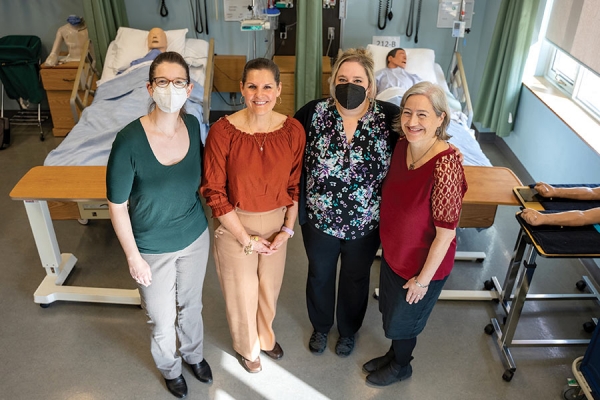 Professors Dana Ménard, Laurie Freeman, Kendall Soucie, and Jody Ralph are part of a research team developing modules to prepare graduating nurses entering the workforce for moments of extreme anxiety.
Professors Dana Ménard, Laurie Freeman, Kendall Soucie, and Jody Ralph are part of a research team developing modules to prepare graduating nurses entering the workforce for moments of extreme anxiety.
The Faculty of Nursing recognizes and celebrates nurses during National Nursing Week. As part of its celebration, the faculty is sharing stories throughout the week that showcase how UWindsor’s nursing education prepares students to become contributors to health care.
The nursing profession, such a vital part of the health-care system, has been challenged by the COVID-19 pandemic. Attrition, whether due to widespread burnout or early retirement, has created a void; young nurses are most at risk for negative health consequences due to work stress.
Nursing professors Jody Ralph and Laurie Freeman, along with lead researcher Dana Ménard and her colleague in psychology Kendall Soucie, are developing simulation modules to prepare graduating nurses entering the workforce for moments of extreme anxiety.
“By having the nursing graduates participate in mock scenarios closely simulating real world circumstances, we better equip them to handle unplanned situations,” says Dr. Ralph.
“For instance, they could be given immediate and increased patient workload due to staff absence. On top of that, they could encounter stressful moments with a patient’s family and possible demands from other staff members. There are just so many factors that come into play unexpectedly.”
The 10-week program includes such modules as:
- Recognizing the effects of heavy workloads and changing care patterns
- Recognizing moral distress and burnout in self and others
- Recognizing signs of impaired mental health in self and others
- Trauma-informed care: recognizing trauma in self and in patients
- De-stigmatizing mental health issues
- Addressing moral distress and burnout in self and others
- Finding support and coping with mental health issues
- Patient mortality (end-of-life care and managing grief)
- Working effectively on multidisciplinary teams
- Self-advocacy by nurses
”Currently, we are building the 10 simulations and education modules and testing them in person with a small pilot group,” says Dr. Ménard. “Then we will transition to an online platform over the summer, so that the program can be offered asynchronously and tested at multiple universities including the University of Ottawa and Queen's University.”
Ménard adds that the modules are designed to build resilience and coping strategies in nursing students by practising their assertiveness and problem-solving in difficult but realistic situations. Using simulations allows nursing students to learn non-clinical skills in a safe, supportive, and non-threatening environment.
Ménard and Ralph agree that the future of nursing depends on adapting to, and providing solutions for, workplace barriers and establishing blueprints that support self-care resulting in a healthy, competent, and sustainable workforce.
—Gam Macasaet






